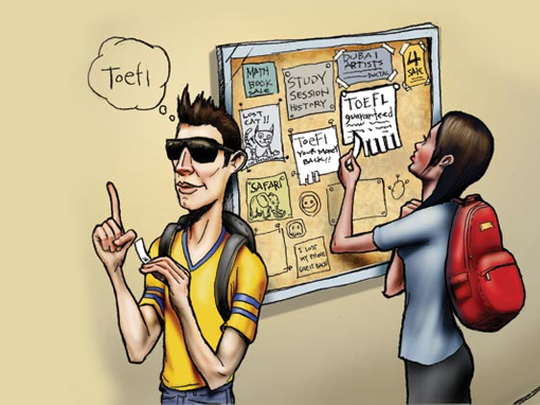
Authorities are probing irregularities that were recently uncovered concerning the Test of English as a Foreign Language (TOEFL).
The Educational Testing Services (ETS) department is investigating internet-based TOEFL (IBT) testing centres across the country which are reportedly offering high TOEFL scores for a minimum price of Dh5,000. Two centres, situated in Al Ain and Sharjah, have already been shut down.
The irregularities have forced UAE-based universities to revise their admission requirements regarding a potential student's proficiency in English.
Last year, America-Mideast Educational and Training Services (AMIDEAST), which runs testing centres for the ETS in the UAE, received reports from universities across the country about irregular results submitted by students. Alarmed universities reported the cases of IBT scores not reflecting students' proficiency in English.
"Candidates placed in Level Six [of English programmes] were clearly no more than a Level One or Two in English," Randa Barghouti, AMIDEAST's head of testing services, said. Randa heads AMIDEAST's three centres at the American University of Sharjah (AUS), Dubai Knowledge Village and CERT Technology Park at the Higher Colleges of Technology
Impersonations
So how could this happen? Randa said they had since established that certain testing centres in the UAE made no secret of the fact they accepted bribes in return for candidate impersonations.
"The issue is within those testing centres, where agreements have been made between candidates and proctors," Randa said.
She added that certain independent centres would follow a legitimate process of accepting applications and photographs but would then be bribed to allow impersonators to sit the exam for the recorded candidate.
She said when IBT scores are sent to universities, there is no verification of the centre at which the candidate was tested.
"Two of these centres have already been closed down in Al Ain and a few in Sharjah and they will [remain inoperational]," she said.
As part of ETS' investigation, "secret shoppers" have been sent to 50 UAE centres to expose the illegal practices.
Revising policies
Tom Alibrandi, Director of Intensive English Programme (IEP) at the AUS, conducted a statistical analysis of test scores received from test centres outside the university.
"Sometimes the scores were all over the place," Alibrandi said. "They were out of the range of probability or reliability."
He said the AUS took measures to curb such cases, nearly 14 months ago, and had now added a clause to the institution's IEP application. It states that the AUS reserves the right to require students in the IEP to retake a TOEFL exam deemed unreliable on campus.
Abu Dhabi University (ADU) took similar action due to irregular test scores.
"A statement was added into the undergraduate admission policy," Fiona Wilson, Executive Director of Public Relations, said.
"In case [the] ADU doubts the authenticity of TOEFL certificates, [a] student will be requested to sit for the IT TOEFL and WritePlacer test at [the] ADU."
Although Alibrandi refused to give exact figures of how many cases of irregularity were brought to his attention, he said: "The problem was large enough that it caught my attention and we moved to stop it. Results are meaningless if people can bypass the system."
Most institutions, including the AUS and the ADU, will now automatically dismiss students attempting to submit falsified certificates or results.
— With inputs from AUS student Pashma Deepak Manglani
Moving away from TOEfL
Middlesex University Dubai (MUD) and the Higher Colleges of Technology (HCT) accept TOEFL but do not prefer it.
"It is primarily an English language test designed to transition students into American universities," said Brian Keenan, Dubai Women's College's dean of the foundation diploma division.
"It has a strong cultural bias and is not the best instrument available."
Racquel Warner, international foundation programme coordinator at the MUD, says TOEFL does not independently show a student's suitability for university admission.
"It is a false correlation to think that if someone is proficient in English according to [the] TOEFL [system], they are ready for university," she said.
The British International English Language Testing System (IELTS) is also a commonly used English language proficiency test. However "problems arise when you start to use it to test for university readiness," Warner said.
The Pearson Language Tests (PLT) has also been developed in the UK as an alternative to the TOEFL. Offices are in Dubai Media City and Zayed University.


